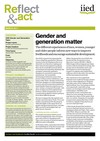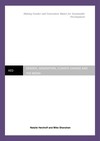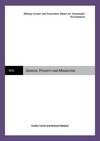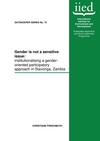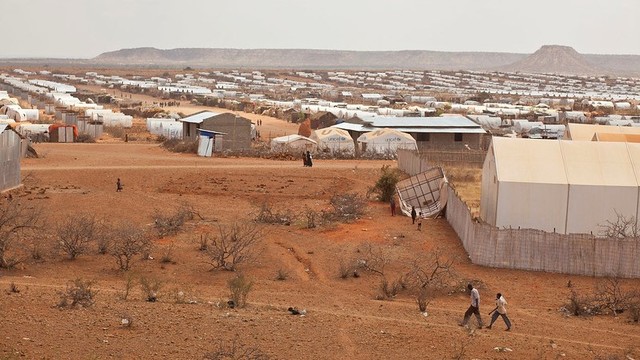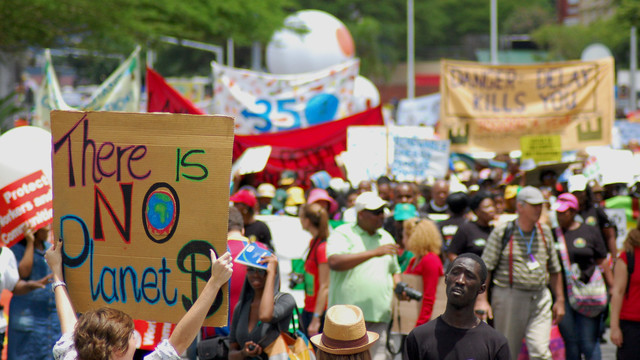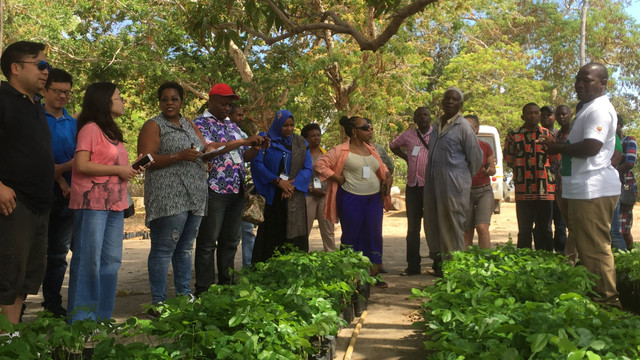Making gender and generation matter
The gender and generation team aimed to bring together the work of IIED and its partners to analyse and integrate gender and generation issues in all its activities, and to engage and contribute to the emerging debates.

Old woman in the village, Niger (Photo: copyright Marie Monimart)
Gender is still largely considered to be about women rather than about a vital dynamic in society. And often gender issues are seen as a concern of the global North.
The interlocking of production and social reproduction, the formal and informal sectors, and the constantly evolving relations between men and women, and between younger and older generations, are at the heart of this dynamic. A strong analysis of gender and generation is crucial to understanding power imbalances and being able to influence them.
This activity reflected the perspectives and work of our Southern partners and of local organisations in the South, and contributed to the emerging debates on poverty reduction and sustainable development.
Background
Social change is closely intertwined with the articulation between production and social reproduction. Both are essential for individuals, households, communities and wider societies to function. They are also related to gendered roles and responsibilities, where social reproduction is usually associated with women and production with men.
However, this distinction is fluid, reflecting different ‘public’ provision of social reproduction services, women’s (and men’s) participation in labour markets, wealth and status inequalities, and the constantly evolving relations between men and women as well as between younger and older generations.
In times of economic instability, the state has traditionally curtailed its role in the provision of services, relying instead on households. This usually means an increase in the burdens traditionally shouldered by women, such as care for children and the elderly.
While this mostly directly affects women, it also affects all household members as it becomes more difficult for women to reconcile productive and reproductive activities. Vulnerability to stresses and shocks thus increases as incomes decline.
There can also, however, be unexpected consequences, for example the growing number of young women and girls who migrate to urban centres responding to demand for domestic service by urban households. In turn, their remittances are often a crucial element of rural livelihoods, especially in areas where family farming is under threat from environmental and socio-economic transformations.
What did IIED do?
The project aimed to bring together the work of IIED and its partners and develop the capacity to analyse and integrate gender and generation issues in all activities, and to engage and contribute to the emerging debates. The perspective and work of IIED's partners have a key role in driving the agenda for this activity.
Watch a video on this issue produced by IIED. Former IIED international fellow Marie Monimart and Michel Pimbert (formerly with the IIED agroecology team) discussed whether agricultural research takes into account gender relations when analysing access and control over land and other natural resources.
The first stage of this project was expanding ongoing activities and documenting case studies of IIED's and partner work that reflects on the role of gender and generation. The case studies include:
- Gender and access to land and natural resources in Mali and Niger: this paper outlines research carried out in Mali and Niger on how women’s access to land and natural resources is changing.
- Gender issues and Slum/Shack Dweller Federations: this paper documents the emergence of the first women-led slum dweller Federation, Mahila Milan, which was established in Mumbai, India with the support of a local NGO, the Society for the Promotion of Area Resource Centres (SPARC).
- Exploring mobility and migration in the context of rural-urban linkages: why gender and generation matter: this paper draws from research on rural-urban linkages conducted in sub-Saharan Africa and Southeast Asia, with particular attention to work in northern Tanzania.
- Raising the profile of Gender and Generation: The role of the Climate Change Media Partnership: this paper details the initiatives taken by the Climate Change Media Partnership (CCMP) to strengthen journalists’ understanding of the importance of gender and generation when reporting on climate change.
Integrating activities
Urbanization is often associated with greater independence and opportunity for women – but also with high risks of violence and constraints on employment, mobility and leadership that reflect deep gender-based inequalities. These issues are explored in a gender and urban change issue of Environment & Urbanization.
There is growing recognition that finding appropriate responses to climate change requires a broad understanding and approach beyond the scientific, and that policy reform must be part of a process of social and institutional change. 'Mainstreaming gender and climate change in Nepal' examines one dynamic which underpins this process of change - gender. It provides an analysis of the extent to which gender differences are taken into account in the development of policies and plans for adaptation to climate change in Nepal and investigates the opportunities and progress made toward mainstreaming gender into policy more widely.
Nearly 50 countries have begun preparing for readiness to reduce emissions from land use and land use changes under the UN-REDD and Forest Carbon Partnership Facility processes. Because gender disparities profoundly shape agriculture and other land use, REDD+ readiness plans should not only avoid harming women and other marginalised groups, but actively seek to address their needs and harness their strengths.
A gendered perspective of urban poverty reveals the significance of non-income dimensions such as time poverty, and highlights fundamental issues of equality and social justice by showing women’s unequal position in the urban labour market, their limited ability to secure assets independently from male relatives and their greater exposure to violence.
All over the world citizens are starting to demand accountability from those in power. We are seeing exciting experiments in participatory governance. But are they working for young people? What spaces are most promising for the participation of children and young people in governance? Contributors to this special issue of Participatory Learning and Action (en français) demonstrate how this is changing.
Existing research has amply demonstrated that analyses of gender and generation are important to the success of sustainable development initiatives, and many available tools and approaches already reflect this. Yet IIED’s work on gender and generation has been scattered and uncoordinated. This briefing gives an overview of the issue and highlights the activities already under way across research groups, emphasing the need to make this an institutional priority and a key objective in IIED’s five-year strategy.
Publications
Additional resources
Environment and Urbanization: Gender and urban change, Cecilia Tacoli, David Satterthwaite, Sylvia Chant, Celine d'Cruz, Patience Mudimu, Caren Levy, Cathy McIlwaine, Sarah Bradshaw, Nicola Banks, Julian Walker, Alexandre Apsan Frediani, Jean-François Trani, Kaveri Haritas (2013), Environment & Urbanization Journal
Mainstreaming gender and climate change in Nepal, Jony Mainaly, Su Fei Tan (2012), Working Paper
His REDD+, her REDD+: how integrating gender can improve readiness, Isilda Nhantumbo, Linley Chiwona-Karltun (2012),
IIED Briefing
Urbanization, gender and urban poverty: paid work and unpaid care work in the cities, Cecilia Tacoli (2012), Working paper
PLA 64: Young citizens: youth and participatory governance in Africa, Jessica Greenhalf, Rosemary McGee (editors) (2011) | en francais
UNFPA Technical Briefing: Urbanization, gender and poverty, Cecilia Tacoli (2012), Briefing
